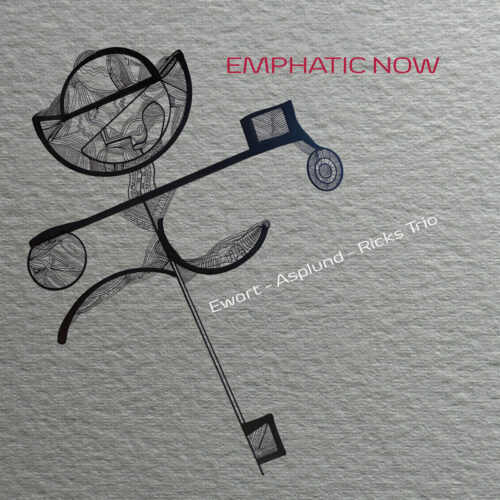Emphatic Now is a journey. A journey through organized improvisation, spontaneous reflection on the world and a creative commitment to the meaning of art. Douglas R. Ewart (woodwind, didjeridoo, percussion, vocals and text), Christian Asplund (viola and piano) and Steven Ricks (trombone and electronics) improvise freely but remain firmly attached to the themes underpinned, often but not exclusively, by Ewart’s texts. Whether the themes are political/environmental, emotional (love) or humanistic (the plight of women in underdeveloped countries), Ewart gives them great force against a backdrop of bursts of sound, cries or snatches of melody created by his two companions. Here are a few examples:
“Don’t create the crisis, and then… cry“
“Is love something we find or something we cultivate, or is it manifold?“
“Love is never blind, it sees with the clarity and wiseness of an owl“
“Ever had to carry water?“
In “Call to Attention,” the first track on the album, you sometimes get the impression of being in a George Crumb world, with vaguely exotic, onomatopoeic flashes and almost tactile bursts of sound. Spontaneously executed asperities appear, sometimes violent, but often almost lyrical, in any case highly evocative of beautiful and intriguing tableaux. The style is resolutely contemporary in its fragmented architecture, but the various motivic and thematic particles, and in some passages even genuine melodies, orbit around well-defined tonal centres, albeit in a state of continual metamorphosis. All this creates a sense of coherence that is more appealing than a purely abstract and experimental approach.
In “The Isness of Love,” the drone created by the didjeridoo evokes (perhaps?) the obsessive questioning we all have about love. Ewart recites his own textual improvisation on the subject, in a felt rather than premeditated agreement with his colleagues.
I won’t describe each of the other pieces, except to say that the rest of the programme is more typically contemporary in its structural pointraitism, but the energy released by the instinctive interventions of the three musicians is highly communicative, as well as imposing an urgency of listening and an intensity of auditory concentration that happily stands out in a musical world that crushes us with its swiftism and other empty facilities.
Not for ears or sensibilities weakened by a certain commercial pop superficiality, but a memorable adventure for those who embark on it with openness and daring receptiveness.
Douglas R. Ewart – woodwinds, didgeridoo,
percussion, voice, texts
Christian Asplund – viola and piano
Steven Ricks – trombone and electronics
























